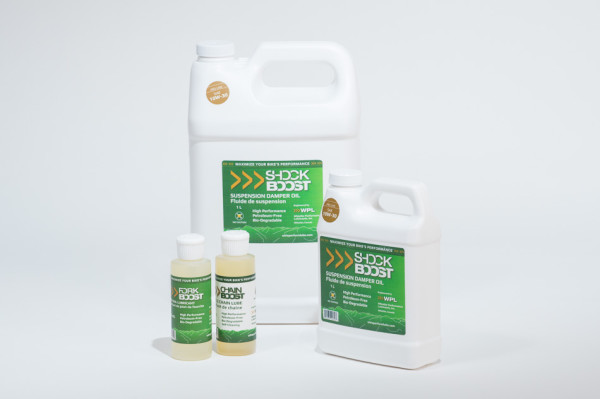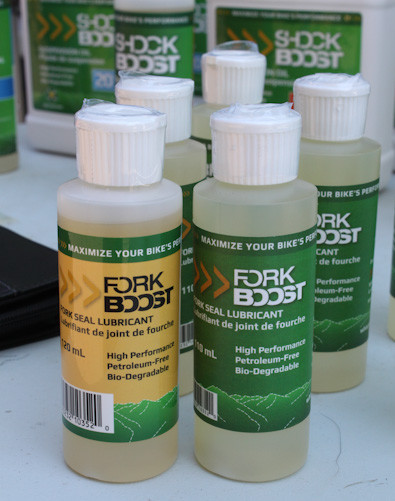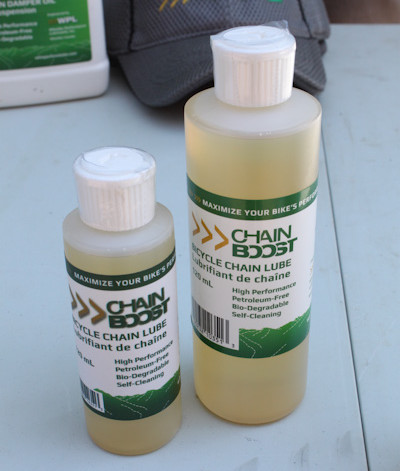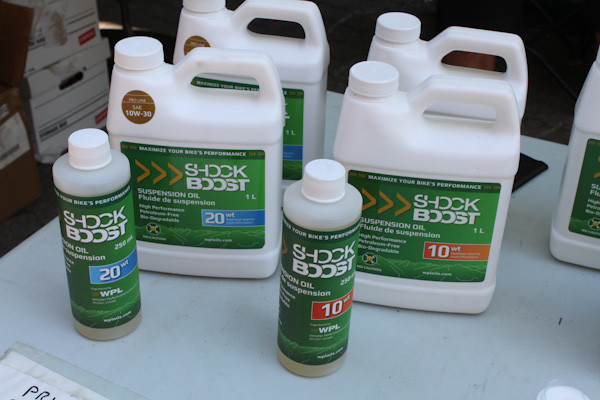After roughly two years of product development, Whistler Performance Lubricants emerged onto the mountain biking scene last summer. The rider owned and operated company specializes in manufacturing high performance, environmentally friendly lubricants for forks, rear shocks and chains. We met WPL’s President and accomplished chemist Alejandro Marangoni, and General Manager Isaac Marangoni at Crankwork Whistler to get the low down on their high-end oils.
WPL’s products are all non-toxic and biodegradable, so they’re safe to the touch and require no special handling procedures. Their shock oils are also free of additives to resist burning, increase their lubricity and reduce the sticky feel that other brand’s oils can produce. All of WPL’s products are developed and manufactured in Canada from renewable resources, and here’s what they had to show us at Crankworx…
WPL’s Fork Boost is a handy fork seal lubricant and cleaner. The product is applied to the stanchion tubes, and as you cycle the fork up and down it lifts the dirt out of your seals leaving them clean and freshly lubricated. This allows the seal to do its job best by keeping them compliant and removing the grit and grime that can hamper their precise fit.
Alejandro Marangoni said their Fork Boost has proven quite popular with racers, or everyday riders and mechanics who are fussy about suspension performance. They had a demo bike on display at the tent, and its fork seals looked like they’ never seen dirt or dust.
Their Chain Boost is called a ‘wet’ lube but the company recommends using it for all conditions. The Chain Boost emulsifies with water, so when you want to wash it off just blast it with a hose or run it though a wet rag and the accumulated dirt and dust shed off with the lube, leaving your drivetrain squeaky clean. That said, the formula doesn’t come off so easily that riding in the rain or splashing through puddles will de-lube your chain. Marangoni says Chain Boost lasts a long time and most riders tend to re-apply it when cleaning their chains, but well before it wears itself out.
WPL’s Shock Boost is designed to resist cavitation and air emulsification, and is compatible with all types of seals. The oil comes in several different weights to meet various manufacturer’s specifications. It is sold in 20wt, 10wt and 2.5wt, and there is a mixing chart on the back of the bottle so you can whip up intermediate weights by blending two types together.
WPL says their service intervals remain the same as whatever your manufacturer typically recommends with their stock oil. The company recommends cleaning your shock or fork internals with ethanol, but say with the additive-free oils there is little risk of contamination. The purity of the oil also keeps burning at a minimum- when oil goes black it’s typically due to additives burning up over time, but WPL’s products don’t have any, so they stay clean and clear.
Whistler Performance Lubricants already has plans to develop their own pivot grease, bike wash and bike polish, so keep an eye on their website for future releases. Their products are available online through MEC, Vorsprung Suspension or Dunbar Cycles, and at various bike shops across British Columbia.




